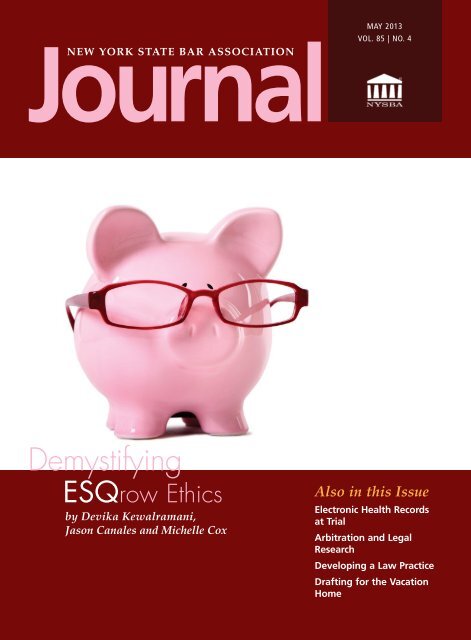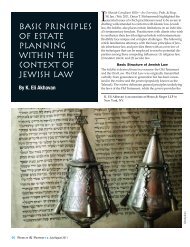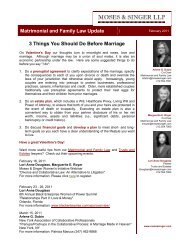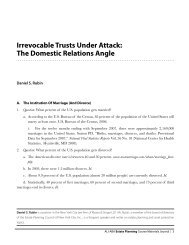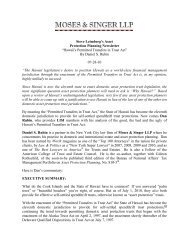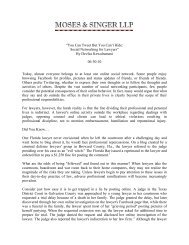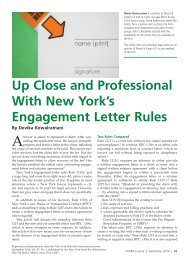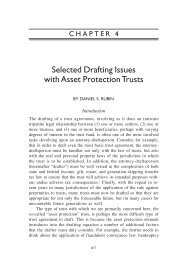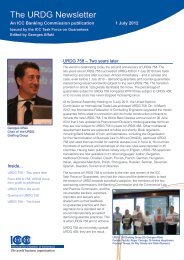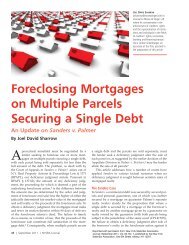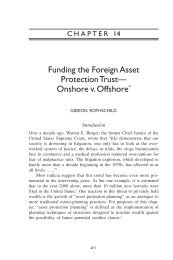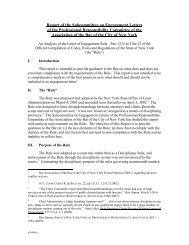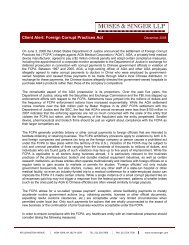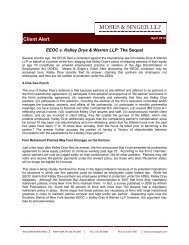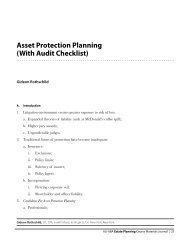You also want an ePaper? Increase the reach of your titles
YUMPU automatically turns print PDFs into web optimized ePapers that Google loves.
JournalNEW YORK STATE BAR ASSOCIATIONMAY 2013VOL. 85 | NO. 4DemystifyingESQrow Ethicsby Devika Kewalramani,J<strong>as</strong>on Canales and Michelle CoxAlso in this IssueElectronic Health Recordsat TrialArbitration and LegalResearchDeveloping a Law PracticeDrafting for the VacationHome
10 | May 2013 | NYSBA JournalDemystifyingESQ
ow EthicsBy DevikaKewalramani, J<strong>as</strong>on Canales and Michelle Coxrhymes with “death row.” This is a handy way to rememberhow carefully a New York lawyer should treat an escrow account.“Escrow”Unlike the American Bar Association Model Rules of ProfessionalConduct (the ABA Model Rules) and rules in other states, New York is theonly state whose ethics rules specifically prescribe disciplinary action formishandling escrow accounts. 1 In addition, New York lawyers are requiredto certify their familiarity with the escrow funds rule, Rule 1.15, when theybiennially register to practice. Clearly, when it comes to escrow funds heldby a lawyer, New York means business.Yet, despite these specific warnings, many lawyers still run afoul of Rule1.15. Some violations are deliberate and flagrant, but others are mere mistakes– subtle and unintentional. Irrespective of intent, however, lawyers whoviolate the escrow rules are exposed to censure, suspension or disbarment.This article reviews some common ide<strong>as</strong> about what constitutes ethicalconduct in handling escrow funds and suggests best practices to avoidviolations.Escrow Ethics: True or False?As long <strong>as</strong> lawyers do not commingle client funds, they have fullycomplied with the escrow rules.False: Implicit in the attorney-client relationship is a fiduciary and ethicalobligation to the client to properly handle client and third-party funds byestablishing and maintaining an attorney trust or escrow account. This dutyis governed by specific ethics rules. Avoiding the commingling of clientfunds is only one of the many duties under those rules.New York’s Rule 1.15 contains strict and strongly enforced rules forescrow accounts. It h<strong>as</strong> a long and detailed list of do’s and don’ts. In additionto prohibiting commingling client or third-party funds with the lawyers’funds (or, of course, misappropriating them), it requires:DEVIKA KEWALRAMANI (DKewalramani@<strong>Moses</strong><strong>Singer</strong>.com) is a partner at <strong>Moses</strong> & <strong>Singer</strong> <strong>LLP</strong>and co-chair of its Legal Ethics & Law Firm Practice group. JASON CANALES is an <strong>as</strong>sociate inthe firm’s Litigation Department. MICHELLE COX is an <strong>as</strong>sociate in the firm’s corporate departmentand is currently awaiting admission to the New York bar. David Rabinowitz, a partner inthe firm’s Litigation Department, contributed editorial <strong>as</strong>sistance.NYSBA Journal | May 2013 | 11
• separate and specially designated accounts forescrow funds;• notification to a client or third person upon thereceipt of escrow funds;• prompt payment from escrow accounts on properrequest;• complete and accurate record-keeping procedures;• disbursements to be made only by New York-admittedlawyers; and• account withdrawals to be made only to a namedpayee and not to c<strong>as</strong>h.he lacked venal intent. 8 Similarly, in In re Tepper, theFirst Department found that a two-year suspension w<strong>as</strong>appropriate for “careless and nonvenal inv<strong>as</strong>ion of clientfunds for personal and business uses.” 9One example of how unintentional conversion canoccur is when multiple client or third-party funds areheld together in a single m<strong>as</strong>ter escrow account. Manylawyers maintain multi-client escrow accounts where thefunds of different clients or third parties are commingled.Although Rule 1.15 explicitly prohibits commingling thelawyer’s funds with client or third-party funds, 10 theEven if a lawyer is not directly responsible for the mishandlingof escrow funds, he or she may still be held accountable.The Preamble to the Rules states that failing to complywith a rule is a “b<strong>as</strong>is for invoking the disciplinaryprocess.” 2 This warning statement is repeated in the finalsection of Rule 1.15. Rule 1.15(j) cautions: “A lawyer whodoes not maintain and keep the accounts and records<strong>as</strong> specified and required by this Rule, or who does notproduce any such records pursuant to this Rule, shall bedeemed in violation of these Rules and shall be subject todisciplinary proceedings.” 3Both intentional and unintentional conversionof client funds can result in disciplinary charges.True: When a lawyer acts with the motive or intent toconvert client escrow funds and deliberately withdrawsor uses such funds without the client’s permission orauthority, courts refer to such conduct <strong>as</strong> acting with“venal” intent. 4 The fact that the lawyer planned to returnthe funds does not mitigate the offense. In In re Birnbaum,the Appellate Division, First Department, observed, “ThisCourt h<strong>as</strong> consistently found that ‘[a]bsent extremelyunusual mitigating circumstances,’ an attorney who h<strong>as</strong>intentionally misappropriated client funds is presumptivelyunfit to practice law and that such conduct warrantsdisbarment.” 5Repayment of converted escrow funds h<strong>as</strong> not beenconsidered an “extremely unusual mitigating circumstance”and “does not excuse the wrongful conduct.” 6As stated by the Appellate Division, First Department,in In re Baumgarten, “[t]he fact that [a lawyer] intendedto replenish the funds he utilized and did in fact payback his clients is not relevant to the issue whether heacted with venal intent. Attorneys, such <strong>as</strong> respondent,who have intentionally converted client funds, must bedisbarred.” 7Unintentional conversion, referred to <strong>as</strong> “nonvenal,”can still result in disciplinary charges. In In re Altomerianos,the Appellate Division, First Department, found atwo-year suspension w<strong>as</strong> warranted where an attorneycommingled and converted escrow funds even thoughrule does not require the lawyer to segregate funds ofmultiple clients or third parties. However, conversionof escrow funds in such joint accounts can take place ifa withdrawal is made for the benefit of a client whosedeposits have not yet cleared the account. In such a c<strong>as</strong>e,the withdrawn amount comes from funds that had beendeposited on behalf of other clients or third parties. In Inre Joyce, the Appellate Division, Second Department, suspendedan attorney for three years after he issued checksfrom his escrow account in excess of the amount availablefor the client and in advance of a deposit which w<strong>as</strong> to bethe source of the funds, causing the checks to be clearedagainst other client or third-party funds. 11Even innocent mistakes in handling an attorney’sescrow account may subject a lawyer to disciplinaryproceedings. For instance, a lawyer may innocently issuea check from the attorney trust or escrow account to“c<strong>as</strong>h,” but this violates the rule because checks drawnon an attorney escrow account must be made payable toa named payee. 12 Although such errors can be innocuous,courts have repeatedly held that acting without venalityis merely a mitigating factor in determining sanctions,but not probative of whether the lawyer h<strong>as</strong> committedan ethical violation. 13No harm, no foul!False: Although in violating the escrow rules a lawyermay not have harmed his client or a third person, thelawyer may still be in trouble. Courts have held that,“[i]n determining an appropriate me<strong>as</strong>ure of disciplineto impose, we have considered the respondent’s allegedlack of venal intent, the fact that he did not use the escrowfunds for his own benefit, and the lack of ultimate harm toany clients or third parties. The [attorney] is, nevertheless,guilty of gross mismanagement of his escrow fund andfailing to supervise and review his escrow account.” 14In In re Francis, the grievance committee filed chargesagainst an attorney for commingling personal funds withclient escrow funds and for failing to maintain an escrow12 | May 2013 | NYSBA Journal
ledger after a check drawn on his escrow account w<strong>as</strong>dishonored. 15 The attorney represented mainly poor andunemployed clients and in attempting to help his clientswould make mortgage and application fee payments ontheir behalf. The attorney also deposited personal moneyinto the account to provide a cushion for these withdrawals.After making payments and returning fees to clientsin need of money, there w<strong>as</strong> a discrepancy in the escrowaccount which resulted in a dishonored check. Althoughthe attorney never converted money for personal use andw<strong>as</strong> helping those less fortunate, the Appellate Division,First Department, found that his “commendable intentionsdid not excuse his failure to familiarize himself withthe rules.” 16 The attorney w<strong>as</strong> censured for nonvenalescrow violations under then-Disciplinary Rule 9-102(a)and (b) (the pre-2009 escrow fund rule, which w<strong>as</strong> substantiallysimilar to the current rule, Rule 1.15). 17Rule 1.15 covers only client funds held in escrow,not funds of third persons held in escrow.False: Rule 1.15 is applicable both to funds held in escrowfor clients and funds held in escrow for third persons.The account establishment, maintenance, segregation,notification and recordkeeping duties for funds held inescrow for clients also apply to funds held in escrow forthird persons. 18 Holding the funds of a third party in anattorney escrow account creates a fiduciary duty to thoseparties <strong>as</strong> well <strong>as</strong> to clients.If one partner in a firm violates an escrow fundethics rule, the other partners are not responsible.False. Even if a lawyer is not directly responsible forthe mishandling of escrow funds, he or she may stillbe held accountable under Rule 5.1, which is titled“Responsibilities of Law Firms, Partners, Managersand Supervisory Lawyers.”Rule 5.1(a)–(c) requires law firms and lawyerswith management responsibility and directsupervisory authority over other firm lawyersto make re<strong>as</strong>onable efforts to ensure that alllawyers in the firm conform to the Rules and toadequately supervise the work of partners and<strong>as</strong>sociates, <strong>as</strong> appropriate. Rule 5.1(d) imposespersonal responsibility on the lawyer for an ethicalviolation by another lawyer if the supervising lawyer(1) orders, directs or ratifies the specific conduct;or (2) is a partner, possesses comparable managerialresponsibility or h<strong>as</strong> supervisory authority over theother lawyer and (i) knows of such conduct whenit could be prevented or its consequences avoided ormitigated but fails to take re<strong>as</strong>onable remedial action or(ii) should know of the conduct so that re<strong>as</strong>onable remedialaction could be taken when the consequences of theconduct could be avoided or mitigated. 19 Furthermore,New York Rules, unlike the ABA Model Rules and thoseof some other states, also place responsibility on the lawfirm itself for the unethical conduct of its lawyers.In In re Cardoso, an attorney w<strong>as</strong> found guilty ofprofessional misconduct for failing to review for irregularitiesthe financial and bookkeeping records of his firmafter his partner deposited and withdrew personal fundsinto the attorney escrow account for personal use, includingmaking payments to himself and to his brother. Afterdiscovering the improprieties, the attorney dissolved thepartnership and contacted the grievance committee. 20The Appellate Division, Second Department, held that,<strong>as</strong> a partner in the law firm, he had “a responsibility tooversee his partner’s handling of the escrow account.” 21The absence of venal intent does not excuse the failureto properly monitor an escrow account, although it canbe a mitigating factor in the severity of the sanctionimposed. 22If lawyers delegate their fiduciary duties tosuitably qualified non-lawyers, such <strong>as</strong> bookkeepersor paralegals, and a mistake is made, they will notbe held accountable.False. Similar to Rule 5.1, which imposes ethical responsibilityfor the conduct of other lawyers, Rule 5.3 imposesethical responsibility for the conduct of non-lawyers(“Lawyer’s Responsibility for Conduct of Nonlawyers”).Rule 5.3(a) requires law firms and lawyers with directsupervisory authority to adequately supervise the workof non-lawyers. Its structure parallels that of Rule5.1: Rule 5.3(b) imposes personal responsibility on theNYSBA Journal | May 2013 | 13
lawyer for a violation of the Rules committed by a nonlawyerretained by or <strong>as</strong>sociated with the lawyer if thelawyer (1) orders, directs or ratifies the specific conductor (2) is a partner, possesses comparable managerialresponsibility or h<strong>as</strong> supervisory authority over the nonlawyerand (i) knows of such conduct when it could beprevented or its consequences avoided or mitigated butfails to take re<strong>as</strong>onable remedial action or (ii) shouldknow of the conduct so that re<strong>as</strong>onable remedial actioncould be taken when the consequences of the conductcould be avoided or mitigated. 23The lawyer’s fiduciary and ethical duty to clients andthird parties to safeguard escrow funds cannot be delegatedaway. While lawyers may have non-legal personneldeal with escrow funds, failing adequately to supervise thenon-lawyers is in itself a violation of the Rules, 24 and anymisuse or conversion of escrow funds by the non-lawyersmay be deemed a breach of that duty by the lawyer. Byway of example, in In re Iaquinta-Snigur, the AppellateDivision, Second Department, suspended an attorney forthree years for, among other things, “[failing] to adequatelysupervise, oversee, inspect, or examine the foregoing workof her nonlawyer staff during the aforesaid period, therebycontributing to numerous account errors, anomalies, andfiduciary improprieties that occurred in connection withthat account during that time.” 25Merely giving access to a lawyer’s escrow account tonon-lawyers is not prohibited. Only a lawyer may controland be a signatory to an escrow account, but a NewYork State Bar Opinion concluded that a paralegal, underthe close supervision of an attorney, may properly bedelegated the use of a signature stamp to execute transactionsfrom an escrow account. 26 However, the attorneycan be held responsible for inadequate supervision in anywrongdoing committed by the subordinate.In In re Gal<strong>as</strong>so, the Court of Appeals affirmed sanctionsfor a lawyer’s failure to monitor and properlysupervise his non-lawyer brother, who w<strong>as</strong> the bookkeeperfor the law practice. The brother converted fundsfrom an escrow account after altering the account applicationto include himself <strong>as</strong> a signatory. 27 Finding thatthe lawyer “ceded an unacceptable level of control” 28over the account to a non-lawyer, the Court held that thelawyer thereby created the opportunity for misuse of theescrow funds and violated the Rules.The most prudent way to prevent ethical violationsresulting from non-lawyer access to escrow funds is diligentlawyer supervision, monitoring and management.Escrow violations arise only in small or solo lawpractices and lead only to disciplinary charges.False: Law firms of all sizes are at risk. Law firms thathave transactional or commercial practices, such <strong>as</strong> realestate, may be at greater risk of an escrow violationbecause they routinely hold funds belonging to the clientor others. In addition, the consequences can go beyonddisciplinary sanctions. Misappropriation of client escrowfunds can result in civil liability to the client; even criminalcharges are possible. 29Best PracticesSegregate, Segregate, SegregateAlthough the Rules do not require that attorneys maintainseparate escrow accounts for each client and permitclient and third-party funds to be held in a single m<strong>as</strong>terescrow account, segregating escrow funds into separateaccounts ensures that no client’s funds are used for thebenefit of another client. If the lawyer is unable to openseparate accounts for each client or third party, the lawyershould keep scrupulous and detailed records of depositsinto and withdrawals from the m<strong>as</strong>ter escrow account.Records, Records, RecordsKey to avoiding escrow issues is implementing a standardizedrecordkeeping process. Lawyers should keepdetailed records of dates of deposits and withdrawalsto ensure that funds withdrawn are already available.Although Rule 1.15 requires only notification of receiptof funds, lawyers may want to make it a practice togive written notification to the client of payments ordisbursements being made from the escrow account onthe client’s behalf.Another good practice is to regularly reconcileescrow account records and monitor accounts, particularlyif a lawyer h<strong>as</strong> delegated this access or control overthe funds to another lawyer or non-lawyer employee.In California, for example, lawyers are required tokeep records of deposits, disbursements, sources offunds, balances of bank accounts, bank statements andcanceled checks. 30 Each month, lawyers are requiredto reconcile these records with one another. Althoughmonthly reconciliation is not specifically required inNew York, a monthly reconciliation of records <strong>as</strong>sociatedwith the lawyer escrow accounts may help preventinadvertent mistakes and also <strong>as</strong>sist in promptly identifyingany mishaps so that they can be quickly remedied.In addition, lawyers should have their records periodicallyaudited by outside accountants to make sure thattheir records are in order, thereby reducing the possibilityof violating Rule 1.15.Supervise, Supervise, SuperviseAs noted above, while a non-lawyer is prohibited frombeing a signatory on an attorney escrow account, nonlawyersmay be permitted to stamp the lawyer’s signature.To reduce the likelihood of misuse or abuse of thesignature stamp, lawyers should restrict or limit access tothe signature stamp, providing access only upon reviewor approval of the documentation requiring the stamp.Providing periodic training for non-lawyers can alsohelp reduce or avoid mistakes in the proper handling ofescrow funds and accounts.14 | May 2013 | NYSBA Journal
Finally, when it comes to your escrow accounts, do nottrust anyone but yourself. As emph<strong>as</strong>ized by the Courtof Appeals in Gal<strong>as</strong>so, “[i]t is the ethical responsibility ofthe attorney – not the bookkeeper, the office manager orthe accountant – to safeguard client funds.” 31 Attorneysshould implement appropriate practices and proceduresto ensure that lawyers and non-lawyers who have accessto their firm’s escrow account are always acting in compliancewith the Rules.Conclusion: Escrow AccountsRequire Continual AttentionDealing with attorney escrow accounts requires completehonesty, but complete honesty is not enough. Caremust be taken in the structure and handling of escrowaccounts, including active supervision and monitoringif escrow duties are delegated. Anything less is invitingserious trouble.■1. New York Rules of Professional Conduct Rule 1.15(j) (the Rules orNYRPC).2. NYRPC Preamble.3. NYRPC Rule 1.15(j).4. In re Squitieri, 88 A.D.3d 380, 382 (1st Dep’t 2011).5. In re Birnbaum, 308 A.D.2d 180, 183 (1st Dep’t 2003).6. Id. (citing In re Landau, 180 A.D.2d 257, 258 (1st Dep’t 1992) (“Ultimaterepayment of the misappropriated funds does not excuse the wrongfulconduct.”).7. In re Baumgarten, 236 A.D.2d 30, 34 (1st Dep’t 1997) (citing In re Glazer,218 A.D.2d 411, 413 (1st Dep’t 1996)). See also In re Kirschenbaum, 29 A.D.3d96, 101 (1st Dep’t 2006) (“the fact that he intended to and did in fact repay thefunds, does not negate venal intent”).8. In re Altomerianos, 559 N.Y.S.2d 712, 717 (1st Dep’t 1990).NYSBABOOKS9. In re Tepper, 286 A.D.2d 79, 81 (1st Dep’t 2001).10. NYRPC Rule 1.15(a).11. In re Joyce, 236 A.D.2d 116 (2d Dep’t 1997).12. In re Abbatine, 263 A.D.2d 228, 231 (2d Dep’t 1999).13. See In re Gal<strong>as</strong>so, 19 N.Y.3d 688, 694 (2012).14. In re Joyce, 236 A.D.2d at 121 (emph<strong>as</strong>is added). See also In re Klugerman,189 A.D.2d 284 (1st Dep’t 1993).15. In re Francis, 78 A.D.3d 106, 107 (1st Dep’t 2010).16. Id. at 109.17. Roy Simon, Comparing the New NY Rules of Professional Conduct to the NYCode of Professional Responsibility (2009) at http://www.nysba.org/Content/NavigationMenu/ForAttorneys/ProfessionalStandardsforAttorneys/CorrelationtableofnewNYrules.pdf.18. See NYRPC Rule 1.15 (c), (d).19. NYRPC Rule 5.1.20. In re Cardoso, 152 A.D.2d 157 (2d Dep’t 1989).21. Id. at 159.22. In re White, 9 A.D.3d 163, 165 (2d Dep’t 2004).23. NYRPC Rule 5.3.24. Id.25. In re Iaquinta-Snigur, 30 A.D.3d 67, 76 (2d Dep’t 2006).26. NY State Bar Ass’n, NY Comm. on Prof’l Ethics, Op. 693 (Aug. 22, 1997).27. See In re Gal<strong>as</strong>so, 19 N.Y.3d 688 (2012).28. Id. at 694.29. Ashley Post, Crowell & Moring Faces Third Lawsuit Tied to FormerEmployee’s Theft, Inside Counsel, Nov. 18, 2011, http://www.insidecounsel.com/2011/11/18/crowell-moring-faces-third-lawsuit-tied-to-former; see alsoLeigh Jones, Crowell & Moring Settles $5.5 Mln Suit Involving Fugitive Lawyer,Thomson Reuter, http://newsandinsight.thomsonreuters.com/Legal/News/2011/12_-_December/Crowell___Moring_settles_$5_5_mln_suit_involving_fugitive_lawyer/.30. See Cal. Rules of Prof’l Conduct R. 4-100 Standard (d).31. Gal<strong>as</strong>so, 19 N.Y.3d at 694.Attorney Escrow Accounts–Rules, Regulations and Related TopicsThird EditionEDITORPeter V. Coffey, Esq.Englert, Coffey, McHugh& Fantauzzi, <strong>LLP</strong>Schenectady, NYASSISTANT EDITORAnne Reynolds Copps, Esq.Attorney at Law, Albany, NYPRODUCT INFO AND PRICES2010 / 330 pp., softbound / CDPN: 40269NYSBA Members $45Non-members $55** Free shipping and handling within the continentalU.S. The cost for shipping and handling outside thecontinental U.S. will be added to your order. Pricesdo not include applicable sales tax.Get the Information EdgeCall 1.800.582.2452 www.nysba.org/pubs Mention Code: PUB1995
Disclaimer<strong>View</strong>ing this or contacting <strong>Moses</strong> & <strong>Singer</strong> <strong>LLP</strong> does not create an attorney-clientrelationship.This is intended <strong>as</strong> a general comment on certain developments in the law. It does notcontain a complete legal analysis or constitute an opinion of <strong>Moses</strong> & <strong>Singer</strong> <strong>LLP</strong> or anymember of the firm on the legal issues herein described. This contains information thatmay be modified or rendered incorrect by future legislative or judicial developments. It isrecommended that readers not rely on this general guide in structuring or analyzingindividual transactions or matters but that professional advice be sought in connection withany such transaction or matter.Attorney AdvertisingIt is possible that under the laws, rules or regulations of certain jurisdictions, this may beconstrued <strong>as</strong> an advertisement or solicitation.Copyright © 2013 <strong>Moses</strong> & <strong>Singer</strong> <strong>LLP</strong>All Rights Reserved


